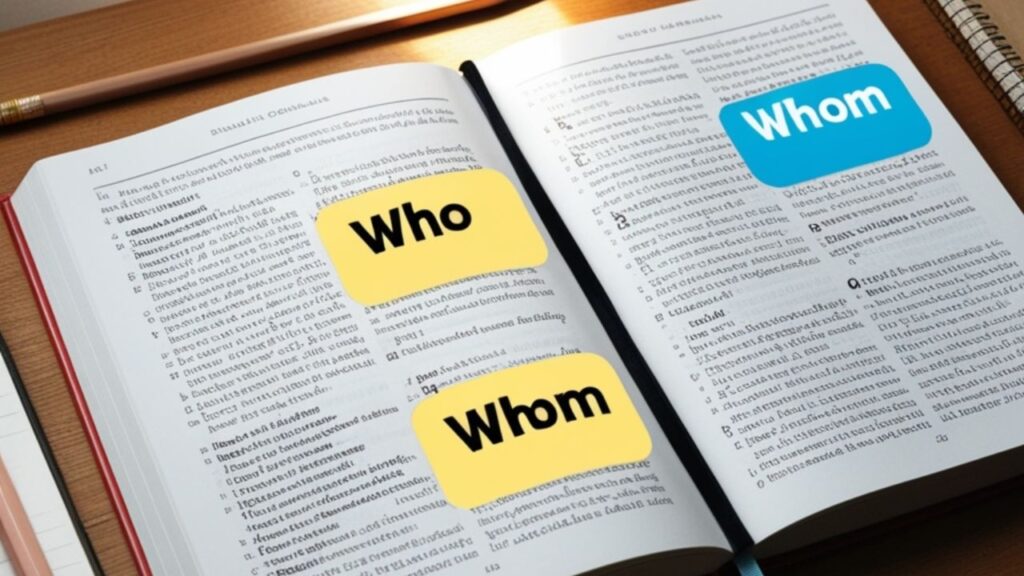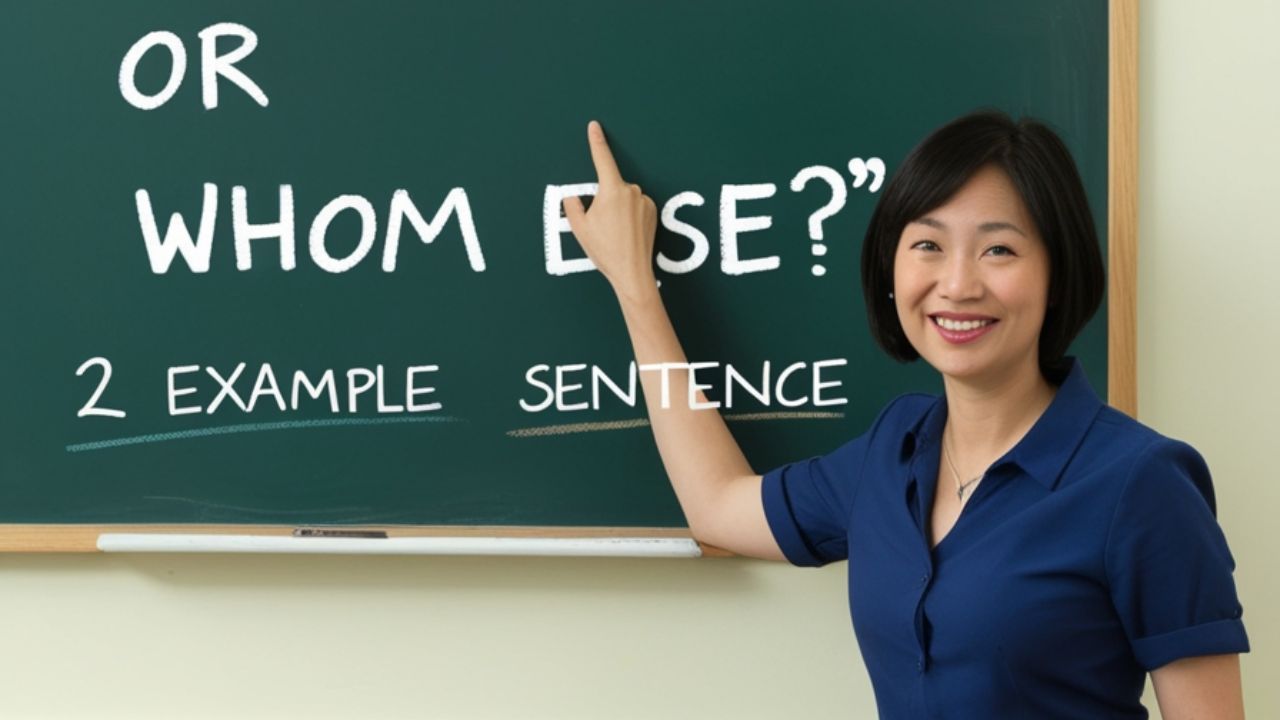Who Else or Whom Else: What’s the Real Grammar Rule? explains how English grammar works in a simple way. Who else is often used when someone does the action. Whom else appears when someone receives the action. Both sound correct, yet their use depends on the sentence’s structure and tone.
In normal speech, people choose who else because it feels natural. The word “whom” sounds too formal in daily talk. Teachers and writers still use it in official writing. The rule stays the same, but real use changes with time and comfort.
Learning grammar becomes easier when examples guide you. For instance, say “Who else is here” when speaking simply, but “To whom else should I write” when being formal. The trick is to listen—if a phrase sounds smooth and clear, it’s probably right.
Quick Answer: Is It “Who Else” or “Whom Else”?
Quick Answer: Is It “Who Else” or “Whom Else”? helps young learners understand simple grammar rules. Who else sounds right when someone does an action, while whom else fits when someone receives it. Both words show how English changes between speaking and writing styles.
People mostly use who else in daily talk because it feels smooth and friendly. The other form sounds very formal and is mostly seen in letters or books. Learning the difference makes sentences clear and helps children write correctly with confidence.
- Who else is used when the word does the action in a sentence.
- Whom else is used when the word receives the action or follows a preposition.
- Most people say who else because it sounds natural in speech.
- Whom else appears mainly in formal writing like letters or essays.
- To choose correctly, replace it with he or him — he means “who,” him means “whom.”
Understanding the Grammar: Subject vs. Object Pronouns
Before we dive deeper, it’s important to understand how pronouns work in English – specifically, the difference between subject and object pronouns.
- Subject pronouns take the place of the person or thing doing the action.
- The main subject pronouns are I, you, he, she, it, we, and they.
- They always come before the verb in a sentence.
- Example: She runs fast. (She is doing the action.)
- Using subject pronouns makes sentences shorter, clearer, and easier to read.
Object Pronouns
- Object pronouns show the person or thing that receives the action in a sentence.
- The main object pronouns are me, you, him, her, it, us, and them.
- They usually come after the verb or a preposition.
- Example: The teacher called him. (Him receives the action.)
- Using object pronouns makes sentences smoother and less repetitive.
Breaking Down “Who” vs. “Whom”

| Pronoun | Role | Function | Example |
| who | Subject | Does the action | Who called you? |
| whom | Object | Receives the action | Whom did you call? |
Trick to Know Which to Use
- Replace the word with he or him to test which sounds right.
- If he fits, use who; if him fits, use whom.
- Example: “He called” → Who called? / “I called him” → Whom did I call?
- This test works for both formal and casual sentences.
- Always choose the form that makes the sentence sound natural and clear.
Does “Else” Change the Rule?
Does “Else” Change the Rule? explains that else only means “in addition to others.” It never changes the meaning of who or whom. The rule for choosing between them stays the same in every sentence, no matter where the word appears.
Adding else simply gives extra meaning to the idea of more people or things. It helps make the sentence clearer and more complete. Learners can remember that grammar rules stay steady, even when a small word like this joins the phrase.
Examples:
- Who else is coming to the party? → He is coming.
- Whom else did you invite to play? → You invited him.
- The teacher spoke to whom else about the project → She spoke to him.
See also : Seem or Seems: Easy Grammar Guide with Examples
How to Identify the Role in a Sentence
Knowing whether “who” or “whom” is correct depends on its function in the sentence. Here’s how you can quickly figure it out.
Step-by-Step Test
- Change the question into a simple statement.
- Replace who or whom with he or him.
- If he fits, use who.
- If him fits, use whom.
- Read the sentence again — it should sound smooth and clear.
Examples:
- Who else is eating lunch? → He is eating lunch.
- Whom else did you meet today? → You met him.
- Who else wants to join the game? → He wants to join.
- Whom else did the teacher help? → The teacher helped him.
- Who else can finish the work? → He can finish it.
Real-Life Usage: What Do People Actually Say?
Let’s break it down.
| Phrase | Grammatical? | Common in Speech? | Formality Level |
| Who else is there? | Correct | Very common | Neutral |
| Whom else did you invite? | Correct | Rare | High |
| Who else did you invite? | Strictly | Very common | Low |
Bottom Line:
Bottom Line: Learning to use who else and whom else helps children write and speak with confidence. Most people prefer the first form because it feels smooth and simple. The second form appears in formal writing but sounds unusual in everyday talk.
Language keeps changing as people speak and write more freely. Grammar rules give structure, but real speech focuses on comfort and clarity. When students understand this idea, they learn to choose words that sound natural while still following the basic rule.
Common Mistakes and Why They Happen
Many speakers try to sound more formal or grammatically correct by using “whom,” but this often backfires.
Common Errors
- Saying to who else instead of to whom else in formal writing.
- Using whom else when who else is the correct choice in casual speech.
- Mixing up subject and object roles in sentences.
- Adding whom just to sound formal, even when it’s not needed.
- Forgetting to check the sentence with the he/him test before writing.
Why the Mistakes Happen
- People try to sound polite or formal without knowing the real rule.
- Learners get confused between the subject and object roles.
- The word whom feels old-fashioned, so it’s often used wrongly.
- Many forget the simple he/him test before choosing the word.
- Everyday speech changes faster than grammar rules, causing confusion.
How Language Is Evolving: Grammar vs. Usage

English is not frozen in time. It evolves based on how people use it.
Key Observations
- The word whom is slowly disappearing from daily English use.
- Most people use who even when whom is grammatically correct.
- Formal writing like law or research still keeps the older form.
- Everyday speech and online writing prefer shorter, easier words.
- Language changes naturally as people choose comfort over strict grammar.
See also : Unregister vs Deregister: Key Differences Explained
Case Study: Corpora Analysis
| Phrase | Frequency per million words |
| “Who else” | 7.32 |
| “Whom else” | 0.02 |
Formal vs. Informal Usage: Which Should You Use?
When to Use “Who Else”
- Use it when someone does the action in a sentence.
- It fits best in everyday speech and writing.
- Works well in emails, stories, and conversations.
- Sounds natural and friendly for both kids and adults.
- Choose it whenever the sentence feels smooth and easy to say.
When to Use “Whom Else”
When to Use “Whom Else” is important for writing that sounds neat and proper. Whom else fits in sentences with prepositions like to, for, or with. It usually appears in school essays, letters, or formal notes where correct grammar matters most.
Writers use whom else when the word receives an action instead of doing it. This choice makes the sentence clear and polite. Children can remember it as the careful form of expression, useful for special writing or respectful communication.
- Use it when the word receives the action in a sentence.
- It fits after prepositions like to, for, or with.
- Works best in formal writing such as essays or letters.
- Helps make sentences sound polite and proper.
- Choose it when grammar rules require a more formal tone.
How to Avoid Sounding Stiff or Wrong
The key is to balance correctness with natural flow.
Tips:
- Use who else for normal speaking and writing every day.
- Keep whom else for formal letters or essays only.
- Try the he/him test to check which one fits.
- Choose words that sound natural and clear.
- Read your sentence aloud to be sure it flows smoothly.
Natural Grammar Examples
| Formal Version | Conversational Version |
| To whom else shall I send this? | Who else should I send this to? |
| Whom else did the manager call? | Who else did the manager call? |
| Whom else should be included? | Who else should be included? |
Quick Reference Table: “Who Else” vs. “Whom Else”
| Situation | Correct Form | Why |
| Subject of the sentence | Who else | “Who” does the action |
| Object of the verb | Whom else | “Whom” receives the action (formal only) |
| Object of a preposition | Whom else | Follows “to,” “for,” “with” |
| Casual/informal speech | Who else | More natural, common |
| Professional/formal writing | Whom else | Preferred for clarity and tone |
Decision Tree: Should You Use “Who Else” or “Whom Else”?
Decision Tree: Should You Use “Who Else” or “Whom Else”? helps learners pick the right form quickly. Who else works when someone does an action, and whom else fits when the word follows a preposition or receives an action in a sentence.
A simple test makes it easier to choose correctly. Replace the word with he or him to check. If he sounds right, use the first one; if him fits, use the second. This rule keeps grammar simple and clear.
Case Studies: Grammar in the Wild
Case Study 1: Business Email
- A worker writes an email asking who should join a meeting.
- The sentence is, “Who else should I include in this thread?”
- The word who fits because it does the action in the sentence.
- Using whom would sound too formal for office communication.
- The correct and natural choice here is who else.
Case Study 2: College Essay
- A student writes an essay about sharing credit for a project.
- The sentence is, “To whom else can credit be given for the success?”
- The word whom fits because it follows the preposition to.
- This formal structure suits academic or professional writing.
- The correct and polished choice in this case is whom else.
Case Study 3: Social Media
- A user posts about a movie and writes, “Who else saw that amazing ending?”
- The word who fits because it does the action in the sentence.
- This form matches casual and friendly online communication.
- Using whom here would sound stiff and unnatural.
- The correct and most natural choice for social media is who else.
Key Takeaways
- Who else is the best choice in most speaking and writing situations.
- Whom else is correct only when it follows a preposition or in formal writing.
- Everyday English prefers clear and easy words over strict grammar.
- Use the he/him test to find the right form quickly.
- Always choose the word that keeps your sentence smooth and natural.
Additional Resources
- Grammarly – offers free lessons and examples on who vs. whom usage.
- Merriam-Webster Dictionary – explains grammar rules with clear examples.
- Cambridge Dictionary – provides simple meanings and sentence guides.
- Oxford Learner’s Dictionary – helps understand formal and informal grammar.
- British Council LearnEnglish – gives fun grammar activities for easy practice.
Conclusion
Final Thoughts show that learning the difference between who else and whom else builds strong language habits. Good writing comes from practice, not fear of mistakes. Children grow confident when they use words naturally while still respecting simple grammar rules.
Clear language helps everyone share ideas better. Grammar is not a burden; it is a guide that keeps meaning easy to understand. When young learners read, listen, and write often, they learn how words work together in a smooth and correct way.
FAQs
Is who else grammatically correct?
Yes, “who else” is grammatically correct and used to ask about additional people.
Which sentence correctly uses who or whom?
Use “who” as the subject and “whom” as the object in a sentence.
Who or whom in a sentence?
Example: “Who called you?” (subject) and “Whom did you call?” (object).
Why is whom not used anymore?
“Whom” sounds formal; modern English often replaces it with “who” in casual speech.

Join Bibcia on a journey to master English grammar. Discover easy lessons, writing tips, and practical examples designed to make learning grammar simple and effective.










